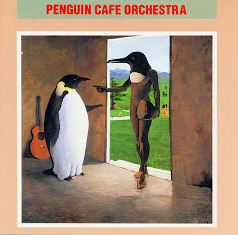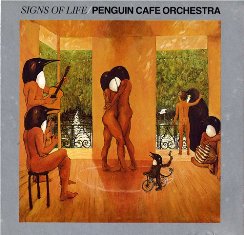The Penguin Cafe Orchestra este invenţia englezului Simon Jeffes. Înainte de PCO, Simon a studiat chitara clasică la Royal Academy of Music şi a cântat pasager în câteva trupe.
ÃŽntr-un interviu, fiul lui Simon, Arthur Jeffes, descrie perfect naÅŸterea trupei:
"Penguin Cafe Orchestra was my dad’s band which went from the late 70s all the way through to when he died in 1997. It was based on this dream he had when he was in the South of France. He had terrible food poisoning and had this waking dream brought about by his fever. It was a dystopian vision of the near future where there were these blocks of flats where everyone lived and it was a very bleak and grey place. You could look into these different rooms and see all these different examples of a dehumanized existence. So in one room there was a couple making love, soundlessly and lovelessly. In another room there was a musician with an array of musical equipment but he had headphones on and there was no music in the room. And in another room there was just someone looking at a screen, immobile and inactive. In the top corner of all these rooms there was a big malevolent camera, fundamentally a big eye spying on all of them. [...] down the road there was this shambolic (other) building with all the doors open in the night with lots of lights and noise and chaotic music coming out and this was the Penguin Cafe. And it was fundamentally a place that you’d want to be. And at the back there was always a band playing music and there were long tables where everyone sat together with sawdust on the floor. Somewhere that it was spiritually rewarding to go. And this band were the Cafe Orchestra. So he decided to play music for that band for the rest of his career. And he did that with a series of brilliant musicians for the next thirty years."

Primul album PCO, descriptiv intitulat "Music From The Penguin Cafe - Performed By Members Of The Penguin Cafe Orchestra" este poate alcătuirea cea mai apropiată viziunii iniţiale a lui Simon Jeffes. Imperfect şi inegal construit, imaginează totuşi un spaţiu viu: Penguin Cafe, loc cu un aer puţin straniu, puţin absurd, provizoriu precum un vis, construcţie fragilă de evenimente nu întotdeauna ordonate şi coerente. Ascultătorul-client se miră de nou descoperitul loc, se acomodează, dar rămâne atent, căci noua lume, chiar dacă prietenoasă, e imprevizibilă; se bucură vizitatorul, bate tactul şi e prezent, căci locul nu-i poate fi indiferent. În final, atmosfera îl absoarbe. Se află la Penguin Cafe şi ascultă Cafe Orchestra - se regăseşte paradoxal melancolic în faţa unui ceva neştiut înainte.
La Penguin Cafe se cântă: electro-acoustic music, minimalism, modern composition, chamber music, world fusion, instrumental folk, new-age, contemporary.instrumental.easy.listening.music, gamelan, parmezan and some other exotic pinguinian music.

Ca şi în cazul primului, titlul celui de-al doilea album, "Penguin Cafe Orchestra", este la fel
de adecvat conţinutului. Prin el ni se spune că acum Penguin Cafe
Orchestra cântă muzica orchestrei şi
mai puţin a locului, a cafenelei. Căci
Cafe Orchestra este trupa ştiută, dar a plecat de la Penguin Cafe şi începe cu
acest al doilea album Călătoria. Şi ce început!
Căci deşi lumea traversată de Cafe Orchestra este una obişnuită, muzica-vehicol are puterea de a transfigura, straniu-amuzant, lucrurile simple şi ştiute: într-un anumit ritm, lumina ce cade pe un copac îi dă un aer naiv, iar o întinsă câmpie sonoră e semn de libertate şi senin. Drumul e în afară şi înăuntru. Sentimentul general e cel al oricărei călătorii: bucurie, excitare şi puţin avânt, joc şi relaxare, uneori calm şi melancolie. Pentru muzica de pe "Penguin Cafe Orchestra", ca şi pentru călătorie, nu-ţi trebuie anume stare sau chef, ele însele sunt starea şi e greu să nu participi.
Acest al doilea album este unul important în discografia trupei, cu el au câştigat popularitate şi relativ succes. Multe dintre piesele sale se regăsesc în manifestările live ale trupei şi unele au fost folosite de producători pentru diverse coloane sonore. Piatră de hotar. Lactobar.


Al treilea album, "Broadcasting from Home", e un popas. Un loc liniÅŸtit unde stai un
timp. E deci relativ convenţional: mai neted, mai normal, mai puţin aventuros, mai
puţin incidental, mai puţin ciudat, mai puţin electric, mai acustic,
calm-relaxat, melodic ÅŸi ambiental, mai egal. Corolar.
Albumul patru, "Signs of Life" – un penguin mai matur din nou la drum. Punctul înalt, întregul rotund.
I can’t sit down and say I’m going to make a record. I’ll spent the time researching, trying out rhythms and tunes and something will pop out of its own accord, it doesn’t seem to be a process I can hurry. Sakamoto(Ryuichi) told me I had a much more Oriental approach than him. (Simon Jeffes)
Urmează o perioadă de 6 ani fără album de studio,
dar în care apare live-ul "When in Rome ..." (1988), înregistrare a concertului
de la "The Royal Festival Hall". Apoi, în 1989, un VHS/LaserDisc cu
spectacolul Royal Ballet şi Orchestra of the Royal Opera House pe muzica PCO, orchestrată şi
aranjată de Simon Jeffes pentru orchestră mare. Un an mai târziu apare şi CD-ul
cu coloana sonoră a baletului în interpretarea BBC Concert Orchestra, plus alte
patru piese PCO adaptate de Simon Jeffes pentru orchestră.
Ultimul album de studio, "Union Cafe", a apărut în 1993 şi a fost urmat doi ani mai târziu de un dublu CD live - "Concert Program" înregistrat la Wool Hall, Somerset, fără public.

Despre "Union Cafe" – mi-a plăcut, dar nu ştiu să vă zic, mai ascult ...
Simon Jeffes a murit în 1997 la 48 de ani.
“The
Proprietor went on to explain his cafe. He said that the random, chance element
in life is totally vital. It is through fear we allow the repression of
spontaneous and unpredictable actions and events in order to make life
"safer", the creativity that arises naturally from the hurly burly of
human life could be destroyed and lost. He kept saying
Music From the Penguin Cafe (1976) 
Penguin Cafe Orchestra (1981) 
Broadcasting from Home (1984) 
Signs of Life (1987) 
Union Cafe (1993)

